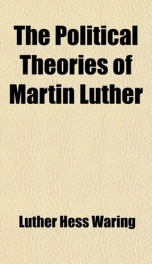the political theories of martin luther

Purchase of this book includes free trial access to www.million-books.com where you can read more than a million books for free. This is an OCR edition with typos. Excerpt from book: CHAPTER IV THE SOVEREIGNTY OF THE STATE A. Viewed Internally COVEREIGNTY is an essential attribute of every independent state. It is the supreme dignity, power, and authority of the state. As Bluntschli defines it: "The state is the embodiment and personification of the national power. This power, considered in its highest dignity and greatest force, is called sovereignty."1 The word sovereignty was first used in this sense, it is commonly asserted, by the Frenchman Jean Bodin in the third quarter of the sixteenth century. He declared that sovereignty is the absolute and perpetual power of a state.2 A later authority on the subject expresses the notion of sovereignty in these words: 1 Bluntschli: The Theory of the State, p. 463. 2 "Puissance absolue et perpetuelle d'une r£publique." Bodin: De la Republique, i., 1. If a determinate human superior, not in a habit of obedience to a like superior, receive habitual obedience from the bulk of a given society, that determinate superior is sovereign in that society, and the society (including the superior) is a society political and independent. ... In order that a given society may form a society political and independent, the two distinguishing marks which I have mentioned above must unite. The generality of the given society must be in the habit of obedience to a determinate and common superior; while that determinate person, or determinate body of persons, must not be habitually obedient to a determinate person or body.1 Sovereignty, as understood in our age, implies absolute political power within the state, supreme power to regulate all affairs within the state,2 and yet itself subject to no authority. It is something more than a mere collection or aggregation of all the various particular powers of the state, su...
Info about the book
Author:
Series:
Unknown
ASIN:
B008II4MQY
Rating:
3.5/5 (4)Your rating:
0/5
Languge:
English
Users who have this book
Users who want this book
What readers are saying
What do you think? Write your own comment on this book!
write a commentGenre
if you like the political theories of martin luther try:
Other books by this author
Do you want to exchange books? It’s EASY!
Get registered and find other users who want to give their favourite books to good hands!


